Juncker to Member States: We Need To Talk!
Adelina Marini, March 3, 2017
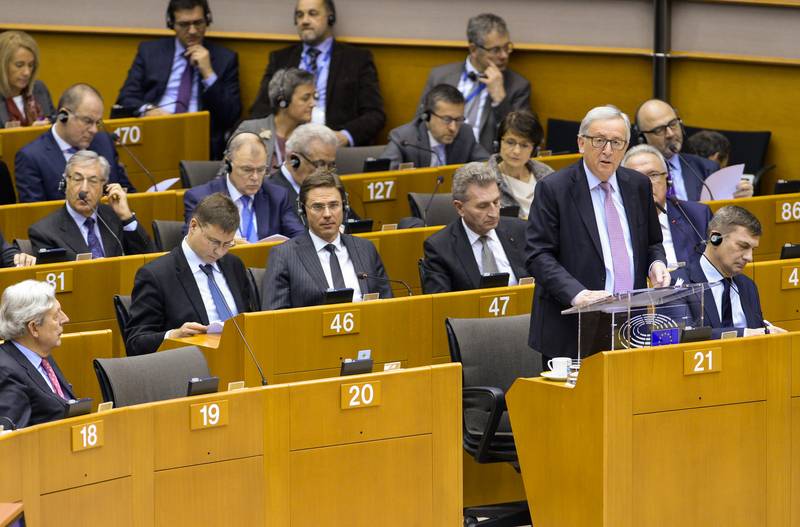 What is wrong with the EU? It is the product of compromise, the result of which is complex legislation, with many exceptions, which creates pockets of integration and practically just the illusion of a single market and community in general. Compromise is deeply embedded in the fabric of the EU, but this fabric has become very diverse. In the beginning, compromises needed to be made between countries with similar views, value systems, which saw their development in the same direction. With EU enlargement and the growth of populism and euroscepticism compromise has become more difficult, because of collision with different and lately increasingly conflicting value systems. Dialogue has degenerated into blackmail and looking for accountability for past events. Some member states have ran out of patience and started to ask more and more often if there is any sense in continuing this way. Others, on the other hand, believe that it is better not to bring up the topic about the future, but to continue as if nothing had happened. Others are completely inert and go with the flow.
What is wrong with the EU? It is the product of compromise, the result of which is complex legislation, with many exceptions, which creates pockets of integration and practically just the illusion of a single market and community in general. Compromise is deeply embedded in the fabric of the EU, but this fabric has become very diverse. In the beginning, compromises needed to be made between countries with similar views, value systems, which saw their development in the same direction. With EU enlargement and the growth of populism and euroscepticism compromise has become more difficult, because of collision with different and lately increasingly conflicting value systems. Dialogue has degenerated into blackmail and looking for accountability for past events. Some member states have ran out of patience and started to ask more and more often if there is any sense in continuing this way. Others, on the other hand, believe that it is better not to bring up the topic about the future, but to continue as if nothing had happened. Others are completely inert and go with the flow.
Another problem is that the unanimity rule is applied in making decisions, although it is not compulsory for all forms of legislative activity. This hinders the work of the Union. At the same time, however, the application of qualified majority voting creates additional tensions between member states, as it did happen with the quota allocation of refugees. This led Hungary to holding a referendum against this legislation with the support of Poland and other countries. A third very serious problem is that adopted decisions are often not applied or are deformed when they set foot on national soil. The reasons are usually political – upcoming election in some member state or a government is of "our" political family, or there is a danger of a government falling if the measures are implemented in full. The examples are numerous and vary from the European semester to the rule of law.
All this increases the division between member states and condemns the Union to timelessness, as it is completely unable, under its current setup and attitudes, to make quick and effective decisions. Existing mechanisms for multiple speed development further complicate the construction because, regardless of the advancement of integration in separate integration circles, all members have equal weight, regardless how deeply they are integrated. In other words, if a group of members are keen on advancing to a new supranational level, this will require opening the treaties for change, which will be blocked by those who want a looser union. The opening of treaties would mean for the EU to lose another decade in dealing with itself.
Juncker will bring Pandora's box to Rome
In recent months, there has been increased talk within the EU that this can no longer continue and something needs to change. There was talk of a multi-speed Europe. Basically the idea is not new, but - attention - there is something new envisioned. Current EU legislation also allows different speeds of integration, based on the assumption that the direction is the same. Nowadays there is talk about the choice of different directions, i.e. multi-directional or multi-level Europe. On March 25, leaders of member states will gather in Rome to mark the 60th anniversary of the Treaty of Rome. All agree that this is a good occasion to analyse the past and to draw a plan for the future.
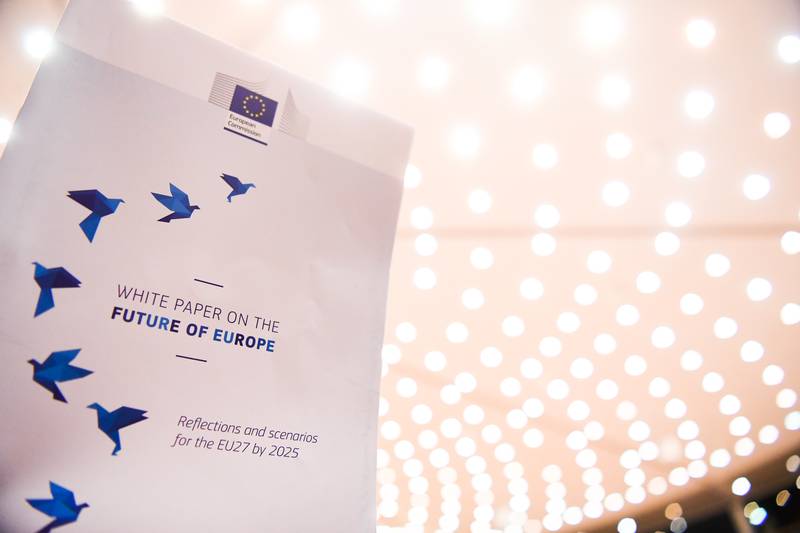 The veteran of European politics Jean-Claude Juncker (Luxembourg, EPP) presented this week to the European Parliament five scenarios with an appeal to the member states to choose one. This is actually a Pandora's Box, the opening of which will radically alter the European political and economic map. The scenarios are a summary of everything which has already been spoken about more or less. What the White Paper of Juncker does for Europe's future is to systematise. It shows in a very straightforward and simple way what the pros and cons of the five scenarios are, what the real implications are, and exactly how it will affect the lives of European citizens. In this sense, Juncker's White Paper is the event of the year.
The veteran of European politics Jean-Claude Juncker (Luxembourg, EPP) presented this week to the European Parliament five scenarios with an appeal to the member states to choose one. This is actually a Pandora's Box, the opening of which will radically alter the European political and economic map. The scenarios are a summary of everything which has already been spoken about more or less. What the White Paper of Juncker does for Europe's future is to systematise. It shows in a very straightforward and simple way what the pros and cons of the five scenarios are, what the real implications are, and exactly how it will affect the lives of European citizens. In this sense, Juncker's White Paper is the event of the year.
Upstream
The first Juncker scenario is for the EU to continue on its current path. That means sticking to the plans for the future contained in the Commission agenda, the Bratislava declaration, and other documents which provide for strengthening integration in the euro area and the fight against terrorism, strengthened cooperation in the field of defence. According to the EC, the advantages of this scenario are that there will be concrete results. The rights of European citizens, stemming from European legislation, will be protected. Cons are that the Union will continue to be exposed to tests of its unity, and this means instability. In particular, this scenario will lead to a strengthening of the single market that will expand to the digital sphere and energy; will improve the functioning of the euro area; will lead to a gradual acceleration of cooperation in the field of border control and will move to a common asylum system.
There will be progress regarding foreign policy and defence, but it will be a moderate one. The common budget will be partially modernised. This scenario, however, will not be able to fully meet the expectations of European citizens. Juncker's White Paper confirmed the conclusion of the High Representative of the European Union for Foreign Affairs Federica Mogherini (Italy, Socialists and Democrats) that the soft power of the EU is an already exhausted approach.
A loosening of the EU
The second scenario could safely be named British, although other states aspire to it like Hungary and Poland for example. This scenario downshifts by several integration gears and turns the Union into a simple common market. Member states turn primary towards a bilateral approach to bargaining, a solid part of European legislation is eliminated. This scenario, however, raises the question about the possibility of its implementation, for in order to have a truly common market legislation in many areas needs to be harmonised in order to facilitate the free movement of goods, services, people, and capital. Currently, the services market continues to be fragmented. There are already visible processes of fragmentation in the possibility for free movement with different legal restrictions being imposed in destination states.
According to the EC, this scenario will keep the differences in many areas such as consumer, social and environmental standards as well as in the taxation sphere and the use of public subsidies. EC sees in it a risk of a race to the bottom. The result will be that the free movement of people and services will not be guaranteed. The euro will suffer as well, there will be more checks at national borders because of a lack of sufficient cooperation in the security and migration spheres.
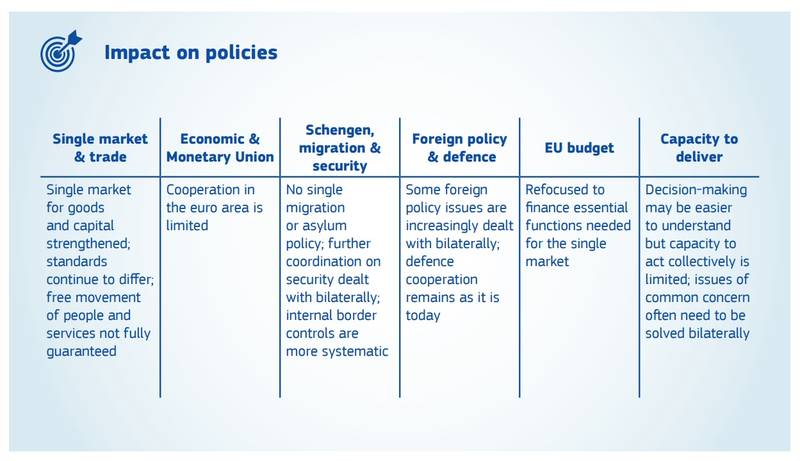
It is difficult to identify any positive sides in this scenario. The EC believes that citizens' rights deriving from EU legislation will become limited over time. Overall, this scenario will increase the gap between expectations and delivery at all levels. What is not said in this scenario, but can be derived as minus from the British case is that the elimination of EU legislation will require strong legislative efforts in the member states, which will block them for years, will isolate them from the ever more aggressive global environment and make them vulnerable. It is not clear whether they have the capacity for such hard work. There are huge risks to fragile democracies hidden here.
Multi-tier Europe
The third scenario appears the most realistic at this stage. It envisages the creation of coalitions of the willing to deepen integration in various fields of their choice. Current European legislation offers similar capabilities too, like the enhanced cooperation procedure settled the matter with cross-border transfer of property rights between married or unmarried couples (including same-sex), with the financial transactions tax, with the creation of a European Public Prosecutor's Office and others. The problem with this procedure is that by law it is required to have a minimum of nine countries willing to participate. If member states choose this scenario, then perhaps an elimination of the mandatory threshold should be considered.
The pluses of the third scenario are that the unity of EU27 will be preserved, at the same time relieving the pressure generated by the constant brakes being pulled by eurosceptic governments. Problems could arise from the manner of making decisions and the accountability of this process. The EC expects that this scenario will build on the first scenario in the euro area, Schengen (plus migration and justice), foreign affairs and defence, European budget (through the development of separate budgets for the different integration circles).
More through less
The fourth option is for member states to focus on those areas they agree on and stop working on the ones they don’t have a consensus on. According to the EC, the areas in which there could be consensus are innovations, trade, security, migration, border management, and defence. The spheres where cooperation will gradually cease because there is not enough value added or commitments cannot be met are regional development, healthcare, employment, and social policy, which are not directly linked to the functioning of the common market. Should member states pick this scenario, it will mean for the poor ones to fend for themselves. A total reworking of the common budget will be needed and European funds will be stopped for countries like Bulgaria, because the results are dubious.
Pluses, according to the EC, are that this way it will be much easier to clearly distribute responsibilities between Brussels and the capitals and people will have a much better understanding of how the Union works. The problem, however, is that member states are experiencing considerable difficulties in negotiating which areas should be prioritised and which ones should not. This division is seen each time the next 7-year EU financial framework is being negotiated.
Quantum leap forward together
The fifth scenario, supported by all pro-European groups in the European Parliament, provides serious integration steps in many areas in a way to make the Union much more effective. Pros in the eyes of the Commission are the much faster decision-making and the cons - that there is a risk of alienating a part of society even more because of the feeling that the EU takes too much power from national authorities. A problem that exists now as well. This scenario envisages deepening the integration of the common market through the harmonisation of standards and stronger enforcement, trade is to be taken out fully on a supranational level. The euro area is expected to walk the full path outlined in the five presidents’ report. Creating a defence alliance and having the EU speak with a single voice in foreign affairs. The consequences for the European budget are also expected to be serious - a bigger budget, powered by its own resources; separate budget for the euro area.
However
There are already ongoing debates in the public domain about which is the most high-speed scenario, with many pointing at the fifth one. The third one, however, looks a lot speedier in integration sense, but it is also the scenario that institutionalises a multi-speed Europe as a concept. At the presentation of the White Paper Jean-Claude Juncker expressly warned that it is not offering anything detailed, so that it leaves the debate in the hands of member states and leaves them the freedom to decide exactly how they are to go forward. Should member states pick this scenario, then the amendment of the founding treaties looks inevitable, and with it come the great dangers for slowly moving countries like Bulgaria, because each integration circle will probably ask for a change of the rules for entering that circle.
This is already evident in the expansion of the entire EU towards countries of the Western Balkans and Turkey. It is important to note, by the way, that in the White Paper there is no change of position towards enlargement. It is expressly noted that no new members are expected “in the short term”. The change is noticeable in Schengen as well. Bulgaria and Romania have technically (on paper) fulfilled all membership criteria, but several member states, led by The Netherlands, are adamantly opposed to it because they do not trust these countries because of their failure (especially that of Bulgaria) to deal with high-level corruption and set up an independent judiciary. There are currently no formal obstacles to euro area membership, but the ECB boss hinted last year that accepting new members will cause some serious considerations because of the failure with Greece and other states, whose condition brings potential risks to the common currency.
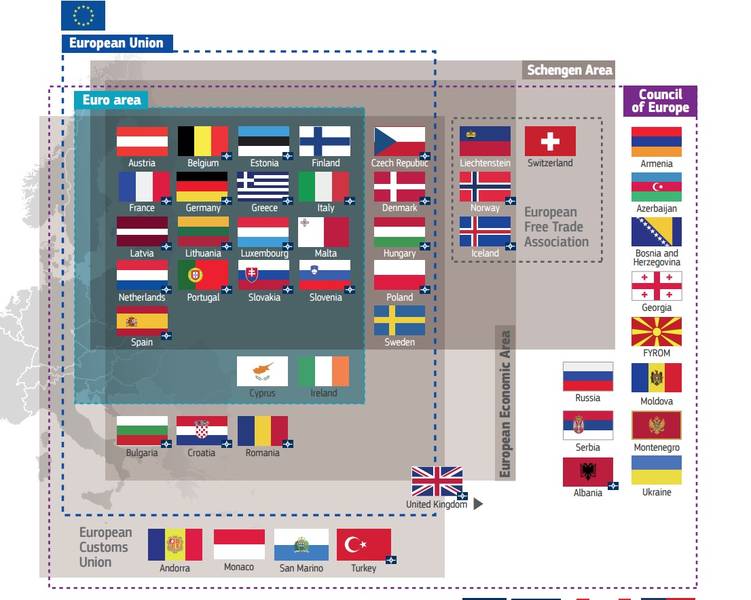 There is one more thing, which was not mentioned in the five scenarios, but which Jean-Claude Juncker emphasised upon in his speech at the presentation of the White Paper on Wednesday afternoon – common values. This is a very serious dividing line, which lays at the foundation of today’s pressure between several new members and the old EU members. Differences in the understanding of EU fundamentals like democracy, rule of law, fundamental rights, have in recent months grown into a true confrontation and even a competition between two opposite ideologies. In this sense, the debates on the procedure against Poland for the protection of the rule of law as well as the protection of fundamental rights and democracy in Hungary are especially indicative.
There is one more thing, which was not mentioned in the five scenarios, but which Jean-Claude Juncker emphasised upon in his speech at the presentation of the White Paper on Wednesday afternoon – common values. This is a very serious dividing line, which lays at the foundation of today’s pressure between several new members and the old EU members. Differences in the understanding of EU fundamentals like democracy, rule of law, fundamental rights, have in recent months grown into a true confrontation and even a competition between two opposite ideologies. In this sense, the debates on the procedure against Poland for the protection of the rule of law as well as the protection of fundamental rights and democracy in Hungary are especially indicative.
In his speech Mr Juncker sent out a strong message to Eurosceptics and populists as well, who do not have a reserved place in the future European architecture, as well as to the ones who consider Brussels to be the enemy. I offer you several quotes from Mr Juncker’s speech in front of MEPs, which show quite clearly what the reason is for requesting a re-commitment of European vows:
"There will come a day – I am sure – when the Treaties will have to be adapted because there is a collective will to do so. That collective will does not exist today".
"The patriotism of the 21st century is two dimensional: a happy patriotism, accepted and acceptable looking inward and a form of solidarity, which is the extension of patriotism to the outside. There are values that continue to bind us together: peace, democracy and solidarity, the rule of law – often threatened – as a foundation helping us to build a fairer society, the equal dignity of all human being, a free and independent press".
"Democracy is a European product and we will defend it everywhere and with all our might".
"The future of Europe cannot be held hostage by electoral cycles, party politics or short-term wins".
"Let us be honest: For too long there has been a gap between what people expect and what Europe is able to deliver?"
"We should not make people believe that we can deliver the sun and the moon if we are only able to deliver a telescope. We should stop communicating on intentions and start focusing on where we can deliver the most tangible results instead".
The EC plans to organise a series of debates in national parliaments about the future of Europe, but promises to be an impartial observer. “Contrary to how it may have been done in the past, this Commission does not prescribe, it does not dictate, it does not instruct. This Commission wants to listen before deciding. No diktats – this is not compatible with my character. I am no dictator”, said Jean-Claude Juncker, who has recently undertaken a battle against member states to make them stop seeing Brussels as the enemy. The Commission is set to publish specific proposals in several spheres. The leaders of member states will have the opportunity for the first time to discuss the White Paper during their spring summit on March 9-10. Juncker hopes that they will adopt it as a foundation for their talks in Rome on March 25 as well. His expectations are that by December member states will have already made their choice.
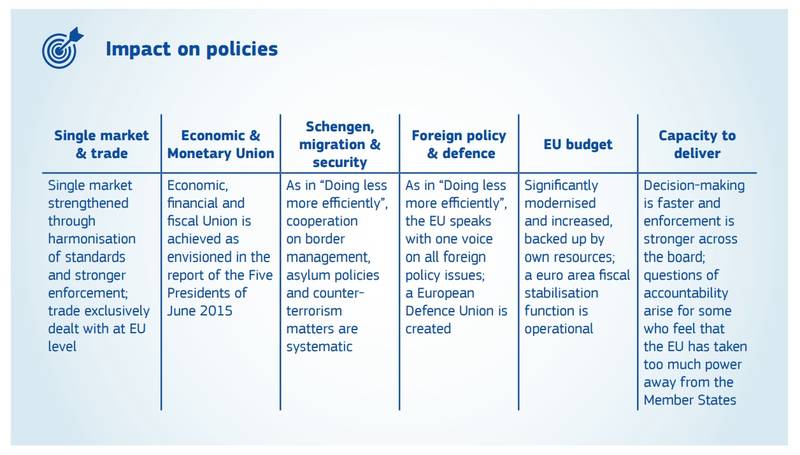 The political moment for this has already matured. Ideas are circulating from all sides as euinside reported. Where there are no differences in the system of values, there are differences regarding speed or the approach or both. But there are also ideological differences. The Hungarian prime minister, for example, wants a loose union where member states are free to choose their own values. Poland supports the same position. A member of this group is also the leader of the National Front in France Marine Le Pen, who is leading in the polls for the presidential elections this spring. After these ideas have been shared once and sometimes more than once in the public space, it is time for member states to tell each other eye to eye whether they wish and how do they wish to continue together.
The political moment for this has already matured. Ideas are circulating from all sides as euinside reported. Where there are no differences in the system of values, there are differences regarding speed or the approach or both. But there are also ideological differences. The Hungarian prime minister, for example, wants a loose union where member states are free to choose their own values. Poland supports the same position. A member of this group is also the leader of the National Front in France Marine Le Pen, who is leading in the polls for the presidential elections this spring. After these ideas have been shared once and sometimes more than once in the public space, it is time for member states to tell each other eye to eye whether they wish and how do they wish to continue together.
Translated by Stanimir Stoev
 Federica Mogherini | © Council of the EU
Federica Mogherini | © Council of the EU | © Council of the EU
| © Council of the EU Luis De Guindos | © Council of the EU
Luis De Guindos | © Council of the EU